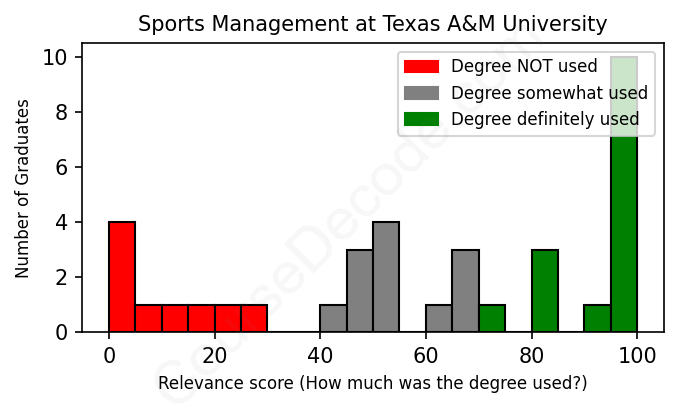
First, some facts. Of the Sports Management graduates from Texas A&M University we've analyzed , here's how many have used (or NOT used) their degree in their career:

These are estimates based on AI analysis of 36 LinkedIn profiles (see below).
The verdict? Below average. Overall, with an average relevance score of 59%, Sports Management graduates from Texas A&M University have a lower likelihood (-8%) of finding work in this field compared to the average graduate across all fields:
And for comparison, here's the chart for all profiles we've looked at across all degrees.
Also, after graduating, 36% of these graduates have pursued further education other than another Bachelor's degree (such as a Masters degree or other), compared to the average across all profiles of 35%. This suggests you may need more than just a Bachelors degree to be competitive as a Sports Management graduate.
See the details:
|
Relevance score: 100% We think this person has gone into a career highly relevant to their degree. We think this person has gone into a career highly relevant to their degree.
DEGREE INFOGraduated in 2018 from Texas A&M University with a Bachelor's degree in Sports Management. Also pursued further education since (see below). JOB HISTORY SINCE GRADUATIONAcademic Mentor Texas A&M University Jul 2018 - Oct 2019 Assistant Learning Specialist  Texas A&M University Oct 2019 - Jun 2021 Academic Advisor III  The University of Texas at Arlington Jan 2022 - Present FURTHER DEGREES DONE SINCE GRADUATINGMaster's degreeTexas A&M University 2019 - 2021 ABOUTNo information provided. |
The top 10 most common jobs done by the graduates we've analyzed (ranked most common to least) are:
When looking at the job titles and careers of graduates from Texas A&M University's Sports Management program, it’s clear that a significant number have found roles closely aligned with the sports industry. Common positions include College Scout with NFL teams, Athletic Assistants at universities, and various roles in athletic event management and operations. These positions generally require skills and knowledge directly tied to the principles taught in their Sports Management degree, such as understanding player evaluation, managing teams, or organizing sports events. For example, jobs like College Scout or Assistant Director of Academic Services for Football show a clear connection, utilizing their training in talent evaluation and academic support tailored for athletes.
However, it’s also notable that a good chunk of graduates have gravitated towards jobs that don’t heavily rely on their Sports Management education. Positions in unrelated fields like finance, law, or customer service pop up frequently in the profiles, indicating that while some graduates are hardcore into sports, others have veered off into various job sectors. So, while many of the roles do tie back to the sports world, there’s a mixed bag overall. If you're considering sports management, be aware that while it opens doors in the sports industry, it might lead you to various career paths that don’t directly apply what you learn in class.
Here is a visual representation of the most common words in job titles for Sports Management graduates (this is across all Sports Management graduates we've analyzed, not just those who went to Texas A&M University):

Graduates from Texas A&M University with a degree in Sports Management seem to have a mixed bag of career paths once they leave school. Many of them dive right into relevant roles in the sports industry, especially in the early years post-graduation. For instance, some kick off their careers with internships or entry-level positions at college athletic departments, professional teams, or sports marketing firms. These initial gigs often lead to more specialized jobs such as athletic coordinators, event managers, or ticketing operations, showcasing a strong connection to the sports world early on. Some graduates have also found success in fitness-related careers, like personal training or management roles at health facilities, which, while slightly tangential, still relate to sports and wellness.
As the years roll on, the trajectories start to diverge more significantly. About five years in, many alumni transition into positions that might not seem directly tied to sports, like sales, marketing, or even roles in entirely different sectors. For example, some graduates move into safety and coordination roles or consultative positions that, while focused on management and operations, don’t have a strong sports connection. By the ten-year mark, it looks like some graduates have settled into stable careers, but not always in sports. There’s a noticeable pattern where a fraction of them ends up in fields like education, finance, or strategic business roles, indicating that while some do thrive in sports management, others simply leverage their degree as a springboard to a variety of paths. Overall, there’s a mix of success stories in the sports arena and others branching out into diverse careers, making it a varied landscape for these graduates.
Getting a Bachelor’s degree in Sports Management at Texas A&M University can be a mixed bag, much like any other program. It’s not necessarily easy, but it’s not the hardest thing out there either. You’ll have your share of tough classes, especially if you’re diving into topics like finance or marketing in the sports world, but it often balances out with more hands-on projects and teamwork that can make things a bit more engaging. If you’re passionate about sports and willing to put in the effort, you might find it more enjoyable than daunting. Just be prepared to juggle some coursework and group work, and you’ll probably do just fine!
Most commonly, in the LinkedIn profiles we've looked at, it takes people 4 years to finish a Bachelor degree in Sports Management.
Looking at the job paths of Texas A&M Sports Management grads, it seems like they've landed some solid gigs, but the money might be a mixed bag. For those working in sports organizations like coaches and scouts, they probably earn decent salaries, especially those advancing into managerial positions. However, others in roles like teaching or entry-level positions in smaller organizations might not be raking it in as much. Some have climbed the ladder to more lucrative roles, while others are in fields with pay that doesn’t always reflect their degree. Overall, it looks like there are definitely opportunities for good money, but it can vary quite a bit based on the specific career choices made.
Here is a visual representation of the most common words seen in the "about" section of LinkedIn profiles who have a Bachelor degree in Sports Management (this is across all Sports Management graduates we've analyzed, not just those who went to Texas A&M University). This may or may not be useful:

Here are all colleges offering a Bachelor degree in Sports Management (ordered by the average relevance score of their Sports Management graduates, best to worst) where we have analyzed at least 10 of their graduates: